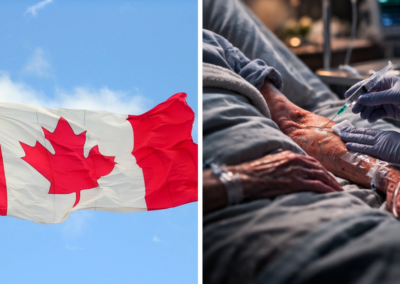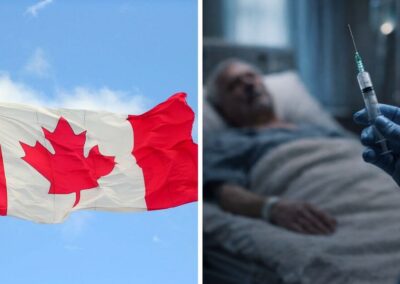Legalising assisted suicide could lead to a “slippery slope” under a proposed Bill in Scotland, MSPs have warned in a recent report.
Scrutinising proposals in Liam McArthur’s Assisted Dying for Terminally Ill Adults (Scotland) Bill, Scotland’s Health, Social Care and Sport Committee directly identified a large number of major flaws with the Bill in its Stage 1 report, and made it clear that dozens of major structural changes need to be made to the Bill, should it pass Stage 1.
As expected with a conscience vote, the Committee did not take a position on the issue.
Fears of a “slippery slope”
Concerns were raised in the report regarding a “slippery slope”, whereby a law with supposedly restrictive criteria for access to assisted suicide is then amended at a later date or later interpreted in a way that allows wider access to assisted suicide. The report stated “On the debate around the potential risks of a ‘slippery slope’ towards a broadening of eligibility criteria and a relaxation or removal of safeguards over time, the Committee notes the very different ways in which legalisation of assisted dying has come about in different jurisdictions around the world”, adding that human rights or other court challenges “could result in eligibility for assisted dying being extended over time”.
Scottish MP John Lamont shared his own fears, saying “[T]he McArthur Bill, as drafted, troubles me”. “When I look around the world at the various jurisdictions that have introduced assisted dying laws, I struggle to find a single example where there have not been adverse consequences for already vulnerable people. Often a law starts out with supposedly strict safeguards, but, over time, these are steadily eroded”.
These concerns would appear to be justified by evidence from Oregon, which assisted suicide campaigners, Dignity in Dying, cite as a model for rolling out legislation in the UK.
A review of the assisted suicide data from Oregon over the last 25 years, published by leading academics in the journal BMJ Supportive & Palliative Care, suggests that since the law was introduced in Oregon, the law has subsequently been interpreted to allow for wider access to assisted suicide.
The academics found that “[s]ince 2010, patients with a range of non-cancer diagnoses have received [physician assisted suicide] including non-terminal illnesses such arthritis, arteritis, complications from a fall, hernia, sclerosis, ‘stenosis’ and anorexia nervosa”.
Residency requirements for assisted suicide in the state of Oregon were removed in 2022, leading to concerns about ‘suicide tourism’.
Assisted suicide Bill “puts disabled people at unacceptable risk”
Committee convener Clare Haughey highlighted an extensive number of areas which “require further consideration”, including “issues around human rights, coercion, eligibility criteria, provision of assistance, self-administration and conscientious objection for healthcare workers”.
The Committee also expressed concerns about the definition of “terminal illness” in the Bill, stating that, if the Bill should progress, “the definition may require further clarification via amendment to ensure it is appropriate for its intended purpose”. Stark warnings on the same issue have previously been shared by Professor David Albert Jones, Director of the Anscombe Bioethics Centre, who argued that the broad definition of terminal illness present in the Bill could allow state-assisted suicide for people suffering from anorexia.
Professor Jones said “Terminal in the Scottish Bill is defined as someone having a progressive incurable disease from which you could die. It could cover anorexia. There have been cases of people with anorexia having [assisted suicide] dying in Oregon in the US”.
While the Committee chose not to recommend amending the definition of terminal illness in the Bill so that it includes a diagnostic time frame, it acknowledged that this omission could lead to the inclusion of people who “may not be approaching death for a considerable period of time”.
Outside of the report, Pam Duncan-Glancy, MSP for Glasgow, the first permanent wheelchair user in the Scottish Parliament, was heavily critical of the Bill, saying “This report confirms what disabled people like me have warned all along: that once a line is crossed, it is incredibly difficult to stop that line moving. Make no mistake, this bill as drafted is very broadly drawn, it does not set a timescale on the definition of terminally ill, merely that someone must have a condition which could end in their premature death”.
“This is already worryingly wide but added to this, is the very real risk, identified by the committee, that this Bill could open the door to far wider interpretations – and it puts disabled people at unacceptable risk”.
A range of flaws identified by the Committee
The Committee identified over 30 issues of concern in the Bill, and called for these matters to be given particular consideration, should the Bill progress. The Committee also noted “specific concerns” around “the need for additional provisions and safeguards within the Bill to address the specific circumstances of young adults aged up to 25”.
Concerns were raised about a lack of clarity and safeguarding in the Bill with regard to people with fluctuating capacity, or who struggle with a mental health disorder. Further safeguarding concerns were highlighted, with the Committee calling for “amendments to provide for independent oversight within the Bill”.
The Committee also raised concerns over protecting the rights, clarity and wellbeing of medical professionals, calling for wording to be amended “to provide suitable legal clarity and protections for medical practitioners, whether they choose to raise assisted dying with their patients or not”. This included a recommendation that those involved in carrying out such deaths have access to “tailored psychological support”.
It highlighted that the Bill “lacks clear provision for the decisions of medical practitioners, as part of the assisted dying process, to be independently challenged or reviewed”.
Regarding the ability of institutions to object to participating in assisted suicides, the Committee called for amendments “to provide further clarity in the Bill regarding how institutions can reasonably expect to be permitted to act in the context of the Bill’s implementation”.
There was also criticism of “significant discrepancies in estimates of training costs associated with the Bill”. Other issues of concern included preventing “doctor shopping”, a need for greater clarity in guidance and a call for more effective “transparency and data collection”. There is also a need for “health practitioners” to “receive the tailored guidance and training they need to be able to assess coercion effectively”.
Overall, submissions to the Committee were close to evenly split between being strongly opposed and fully supportive of the Bill, but among those who made a detailed submission, which was the favoured option for expert witnesses from various disciplines, the vast majority, 92.90% (6,635 of 7,142), were strongly opposed to the Bill.
The public was given the option of making a short or detailed submission to the Committee.
Among all respondents who made submissions to the Committee (either a short or detailed submission), 48.06% strongly opposed the Bill, and 49.30% fully supported the Bill.
“Don’t Risk It. Vote against this Bill”
Responding to the report, Scottish Conservative Councillor James Bundy urged MSPs to vote against the Bill, saying “Assisted Dying can never be introduced safely. Once the door is cracked open, attempts are always made to further eligibility, putting the most vulnerable at risk. MSPs, Don’t Risk It. Vote against this Bill”.
Spokesperson for Right To Life UK, Catherine Robinson, said “The Health, Social Care and Sport Committee has highlighted some of the many flaws in McArthur’s reckless Bill. The dangers contained in this extreme Bill cannot be overstated, and unfortunately vulnerable people will be most at risk if it becomes law. This cannot be allowed to happen”.
“Voting will take place very soon, on 13 May. It is vital that MSPs resist an unwelcome change to the law in Scotland and vote against this dangerous Bill”.
“People in Scotland need support, not suicide”.












